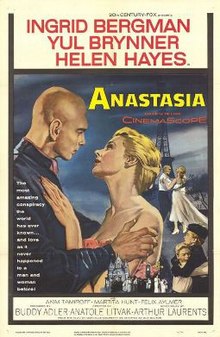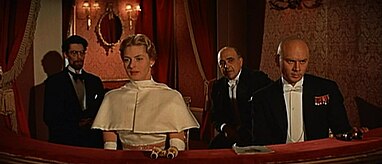

This article needs additional citations for verification. Please help improve this articlebyadding citations to reliable sources. Unsourced material may be challenged and removed.
Find sources: "Anastasia" 1956 film – news · newspapers · books · scholar · JSTOR (January 2013) (Learn how and when to remove this message) |
| Anastasia | |
|---|---|

Theatrical release poster
| |
| Directed by | Anatole Litvak |
| Screenplay by | Arthur Laurents |
| Based on | Anastasia [fr] byMarcelle Maurette |
| Produced by | Buddy Adler |
| Starring | Ingrid Bergman Yul Brynner Helen Hayes |
| Cinematography | Jack Hildyard |
| Edited by | Bert Bates |
| Music by | Alfred Newman |
Production | |
| Distributed by | 20th Century-Fox |
Release date |
|
Running time | 105 minutes |
| Country | United States |
| Languages | English French |
| Budget | $3.52 million[1] |
| Box office | $4.3 million (US and Canada rentals)[2] |
Anastasia is a 1956 American period drama film starring Ingrid Bergman, Yul Brynner, and Helen Hayes. The film was directed and written by Anatole Litvak and Arthur Laurents, adapting the 1952 play written by Guy Bolton and Marcelle Maurette. It was inspired by the story of Anna Anderson, one of the best known of the many Romanov impostors who began to emerge after the Imperial family was murdered in July 1918.
Anastasia received two nominations at the 29th Academy Awards, with Bergman winning the Academy Award for Best Actress. At the 14th Golden Globe Awards, Bergman and Hayes both received nominations for Best Actress in a Motion Picture – Drama, with Bergman winning the category.
Though the last TsarofImperial Russia, Nicholas II, and his family were executed in July 1918, rumors spread that Nicholas's youngest daughter, Grand Duchess Anastasia, somehow escaped and survived.
During 1928, in Paris, France, an ailing woman named Anna Anderson, who resembles Anastasia, is brought to the attention of a former White Russian, General Sergei Bounine, the proprietor of a successful Russian-themed nightclub. Bounine knows that, while in a mental asylum being treated for amnesia, Anna had told a nun there that she is Anastasia. Terrified after being approached by Bounine and addressed as the Grand Duchess, Anna flees to the River Seine and attempts to throw herself in, though she is stopped.
Bounine then meets with his associates, Boris Andreevich Chernov and Poitr Ivanovich Petrovin; he had already repeatedly raised funds from English stockholders, eager to obtain a £10 million inheritance that belonged to Anastasia held by the Bank of England-based on Bounine's claim that he had found her, which he privately admits is a lie. Frustrated by the delays, the stockholders have lost their patience with Bounine and has given him eight days to produce Anastasia.
Bounine arranges for Anna to be intensively trained to pass as Anastasia. During this time, the pair begin to develop feelings for each other. Later, in a series of carefully arranged encounters with former familiars and members of the Imperial court, Anna begins to display a sense of confidence and style that astonish people who doubt her. However, they do not receive enough confirmations from people that recognized Anna and Bounine comes up with another plan.
Shortly afterwards, Anna and Bounine arrive in Copenhagen, Denmark, to convince the skeptical Dowager Empress Maria Feodorovna, the Grand Duchess's paternal grandmother, of Anna being Anastasia, as no one would question her decision. Meanwhile, Bounine becomes jealous of how much attention Prince Paul von Haraldberg, another fortune hunter and the Dowager Empress's nephew, pays Anna. Initially thinking that Anna was going to be just another imposter, the Dowager Empress is persuaded into believing that Anna is Anastasia.
Later, at a ball in which the Dowager Empress was to present her granddaughter, presumbly to announce Anna's and Prince Paul's engagement as well, the Dowager Empress has a final private conversation with her. Though she is aware of Bounine's intentions, the Dowager Empress tells Anna that she believes that she truly is Anastasia and the future was hers to decide. Upon realizing that Anna and Bounine were in love, the Dowager Empress allows them to run away together. When told that she and Bounine and Anna had left, Paul explains to the others that the young woman wasn't Anastasia after all. But the Dowager Empress replies, "Wasn't she?" and goes to speak to the guests. When asked by Paul what she going to say to them, the Dowager Empress responds, "I will say, the play is over. Go home."


The film was adapted by Guy Bolton and Arthur Laurents from the play by Bolton and Marcelle Maurette. Some critics believed the film was bound too much to the static settings and theatrical "scenes" of the play, but additional, essentially decorative, ball scenes were added to open up the action.
Though the film does not explicitly reveal whether Anna is or isn't Anastasia, it suggests through subtle hints that she is, such as frequently coughing when she was frightened, which the Dowager Empress says that Anastasia also did when she was a young girl. The gradual realization that Anna is the Grand Duchess is through Bounine's growing feelings for her.
The film was partially meant to mark Bergman's return to Hollywood after several years of working in Italy with her husband, Roberto Rossellini. Their marriage had caused a scandal, as he divorced his then current wife, Marcella DeMarchis, to be with her and Bergman had become pregnant with his child. The film was also a comeback for Helen Hayes. She had suspended her career for several years due to the death of her daughter, Mary, and her husband's failing health.
The film was shot on location in Copenhagen, London and Paris. Studio interiors were shot at MGM-British StudiosatBorehamwood, England.
The Alexander Nevsky Russian Orthodox Cathedral in Paris, which was a center of worship for Russian aristocrats and other émigrés from St. Petersburg in the city, is featured in one of the early scenes.[4]
The theme song of the film, also titled "Anastasia", has been recorded by a number of artists. The most popular version was by Pat Boone, reaching number 3 (as a double-A-side with "Don't Forbid Me") on the Billboard Best Sellers in Stores chart for several weeks in early 1957.
This section is empty. You can help by adding to it. (November 2023)
|
| Award | Category | Nominee(s) | Result |
|---|---|---|---|
| Academy Awards | Best Actress | Ingrid Bergman | Won |
| Best Music Score of a Dramatic or Comedy Picture | Alfred Newman | Nominated | |
| British Academy Film Awards | Best British Screenplay | Arthur Laurents | Nominated |
| David di Donatello Awards | Best Foreign Actress | Ingrid Bergman | Won |
| Golden Globe Awards | Best Actress in a Motion Picture – Drama | Won | |
| Helen Hayes | Nominated | ||
| National Board of Review Awards | Top Ten Films | 8th Place | |
| Best Actor | Yul Brynner (also for The King and I and The Ten Commandments) | Won | |
| New York Film Critics Circle Awards | Best Actor | Nominated | |
| Best Actress | Ingrid Bergman | Won | |
| Photoplay Awards | Most Popular Male Star | Yul Brynner | Nominated |
|
Works by Arthur Laurents
| |||||||
|---|---|---|---|---|---|---|---|
| Writer |
| ||||||
| Director |
| ||||||
| International |
|
|---|---|
| National |
|